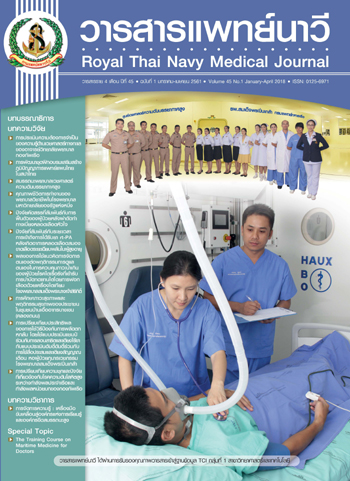การพัฒนาชุดฝึกอบรมเสริมสร้างภูมิปัญญาการแพทย์แผนไทยในสปาไทย
Main Article Content
บทคัดย่อ
การวิจัยกึ่งทดลองแบบกลุ่มเดียววัดผลก่อนและหลังการทดลองครั้งนี้มีวัตถุประสงค์เพือ 1) ศึกษาความต้องการเสริมสร้างภูมิปัญญาการแพทย์แผนไทยในสปาไทย 2) เพือพัฒนาชุดฝึกอบรมเสริมสร้างภูมิปัญญาการแพทย์แผนไทยในสปาไทย และ 3) เพือประเมินประสิทธิผลของชุดฝึกอบรมเสริมสร้างภูมิปัญญาการแพทย์แผนไทยในสปาไทย โดยใช้รูปแบบการวิจัยและพัฒนา (Research and development) ผู้วิจัยได้ดำาเนินการวิจัย 3 ขั้นตอน ดังนี้
ขั้นตอนที่ 1 ศึกษาความต้องการเสริมสร้างภูมิปัญญาการแพทย์แผนไทยในสปาไทย กลุ่มตัวอย่างคือ ผู้ปฏิบัติหน้าที่ให้บริการในสปาไทย จำานวน 400 คน ได้จากการสุ่มแบบหลายขั้นตอน เครืองมือที่ใช้ในการเก็บรวบรวมข้อมูล คือ แบบสอบถามซึ่งได้จากการศึกษาเอกสารงานวิจัยที่เกี่ยวข้องกับภูมิปัญญาการแพทย์แผนไทยในสปา เป็นแบบมาตรประมาณค่า 5 ระดับ ที่ผ่านการตรวจสอบคุณภาพของเครืองมือมีค่าสัมประสิทธิ์แอลฟาของครอนบาคเท่ากับ 0.96 วิเคราะห์ข้อมูลโดยใช้สถิติการหาค่าเฉลี่ย และส่วนเบี่ยงเบนมาตรฐาน
ขั้นตอนที่ 2 พัฒนาชุดฝึกอบรมเสริมสร้างภูมิปัญญาการแพทย์แผนไทยในสปาไทย ที่ได้จากการวิเคราะห์ข้อมูลในขั้นตอนที่ 1 ประกอบด้วย ความเป็นมาและความสำาคัญของปัญหา วัตถุประสงค์โครงสร้างเนื้อหา วิธีการอบรม การวัดและประเมินผล และหน่วยอบรม 4 หน่วย นำาโครงร่างชุดฝึกอบรมให้ผู้เชี่ยวชาญ จำานวน 5 ท่าน ประเมินความสอดคล้องและความเหมาะสมของโครงร่างชุดฝึกอบรม และปรับปรุงแก้ไขก่อนนำาไปทดลองใช
ขั้นตอนที่ 3 ประเมินชุดฝึกอบรมโดยนำาชุดฝึกอบรมไปทดลองใช้กับกลุ่มตัวอย่างซึ่งเป็นผู้ปฏิบัติหน้าที่ให้บริการในสปาไทยที่ธารธาราสปา จังหวัดภูเก็ต จำานวน 30 คน ดำาเนินการทดลองแบบกลุ่มเดียววัดก่อนและหลังการทดลอง และวัดความคงทนของความรู้ความสามารถหลังสิ้นสุดการฝึกอบรม 12 สัปดาห์เครืองมือ คือ แบบประเมินความรู้และความสามารถเกี่ยวกับภูมิปัญญาการแพทย์แผนไทยในสปาไทย และแบบประเมินความพึงพอใจ วิเคราะห์ข้อมูลโดยการหาค่าเฉลี่ย ค่าส่วนเบี่ยงเบนมาตรฐาน และการทดสอบค่าที ผลการวิจัยสรุปว่า
1. ผู้ปฏิบัติหน้าที่ให้บริการในสปาไทยมีความต้องการเสริมสร้างภูมิปัญญาแพทย์แผนไทยในสปาไทยโดยภาพรวมอยู่ในระดับมาก เมือพิจารณาเป็นรายด้านอยู่ในระดับมากทั้ง 4 ด้าน เรียงลำาดับ ได้แก่ ด้านเภสัชกรรมไทย ด้านหัตถเวชกรรมไทย ด้านผดุงครรภ์ไทย และด้านเวชกรรมไทย
2. ผู้เชี่ยวชาญมีความคิดเห็นเกี่ยวกับโครงร่างชุดฝึกอบรมทุกองค์ประกอบมีระดับความเหมาะสมมากถึงมากที่สุด (X = 4.00 - 4.60) และมีค่าความสอดคล้องอยู่ระหว่าง 0.60 - 1.00
3. ผลการประเมินชุดฝึกอบรม พบว่า 1) ความรู้และความสามารถเกี่ยวกับภูมิปัญญาการแพทย์แผนไทยในสปาไทย โดยภาพรวมและทุกด้านหลังการสิ้นสุดการอบรมสูงกว่าก่อนการอบรมอย่างมีนัยสำาคัญทางสถิติที่ระดับ .05 2) ความรู้ผู้ปฏิบัติหน้าที่ให้บริการในสปาไทยโดยภาพรวมหลังการอบรม 12 สัปดาห์ สูงกว่าหลังสิ้นสุดการอบรมอย่างมีนัยสำาคัญทางสถิติที่ระดับ .05 ส่วนความสามารถผู้ปฏิบัติหน้าที่ให้บริการในสปาไทยโดยภาพรวมหลังการอบรม 12 สัปดาห์ สูงกว่าหลังสิ้นสุดการอบรมอย่างไม่มีนัยสำาคัญทางสถิติที่ระดับ .05 และ 3) การประเมินความพึงพอใจของผู้เข้ารับการอบรบที่มีต่อการใช้ชุดฝึกอบรมเสริมสร้างภูมิปัญญาการแพทย์แผนไทยในสปาไทยหลังการสิ้นสุดการอบรมอยู่ในระดับความพึงพอใจมากถึงระดับมากที่สุด (X = 4.27 - 4.83)
Article Details

อนุญาตภายใต้เงื่อนไข Creative Commons Attribution-NonCommercial-NoDerivatives 4.0 International License.
เอกสารอ้างอิง
2. สุวกุล ไตรรัตน์ผลาดล. 18 ปี กรมการจัดหางาน: เข้าใจ เข้าถึง พัฒนาการมีงานทำ. กรุงเทพมหานคร: กรมการจัดหางาน; 2554
3. กรมส่งเสริมการค้าระหว่างประเทศ. ธุรกิจสปาไทย. [อินเทอร์เน็ต]. [เข้าถึงเมื่อ 1 มีนาคม 2559]. แหล่งที่มา: http://www.ditp.go.th/contents_attach/143532/143532.pdf
4. Taba H. Curriculum development: theory and practice. New York: Harcourt, Brace, & World; 1962
5. อารีวรรณ ทับทอง, ปารณัฐ สุขสุทธิ์, สุมนมาลย์ สิงหะ. การจัดการความรู้ภูมิปัญญาสุขภาพวิถีไทในระบบบริการปฐมภูมิและระบบสุขภาพชุมชน. นนทบุรี: สถาบันวิจัยระบบสาธารณสุข; 2556
6. จันทร์ทิรา เจียรณัย, ณัฐฐิตา เพชรประไพ, นรีลักษณ์ สุวรรณโนบล, ศรัญญา จุฬารี. รายงานการวิจัยเรื่อง การศึกษาภูมิปัญญาการแพทย์แผนไทย การผดุงครรภ์แผนไทย และการใช้สมุนไพรของหมอพื้นบ้าน: กรณีศึกษาหมอพื้นบ้านรอบเขตพื้นที่เขื่อนน้ำพุง จังหวัดสกลนคร. นครราชสีมา: มหาวิทยาลัยเทคโนโลยีสุรนารี; 2556
7. พิมพ์นิภา บัวชุม. การประยุกต์ใช้ภูมิปัญญาพื้นบ้านอีสานในการนวดแผนไทยและสปาเพื่อการสร้างมูลค่าเพิ่มเชิงพาณิชย์. [ดุษฎีนิพนธ์ปรัชญาดุษฎีบัณฑิต สาขาวิชาวัฒนธรรมศาสตร์]. มหาวิทยาลัยมหาสารคาม; 2554
8. Pareek U, Rao TV. Handbook for trainers in education management. Bangkok: United Nations Educational, Scientific, and Cultural Organization; 1980
9. นิพนธ์ ศุขปรีดี. ชุดฝึกอบรม. ใน ประมวลสาระชุดวิชาเทคโนโลยีและสื่อสารการฝึกอบรม หน่วยที่ 11. นนทบุรี: สำนักพิมพ์มหาวิทยาลัยสุโขทัยธรรมาธิราช; 2537. หน้า 147-97
10. วิจิตร อาวะกุล. การฝึกอบรม. กรุงเทพมหานคร: สำนักพิมพ์แห่งจุฬาลงกรณ์มหาวิทยาลัย; 2537
11. คุณวุฒิ คนฉลาด. การพัฒนาองค์การ. พิมพ์ครั้งที่ 2. ชลบุรี: ภาควิชาการบริหารการศึกษา คณะศึกษาศาสตร์มหาวิทยาลัยบูรพา; 2540.
12. Bloom BS. Human characteristics and school learning. New York: McGraw-Hill; 1976
13. พิสณุ ฟองศรี. การประเมินทางการศึกษา: แนวคิดสู่การปฏิบัติ. พิมพ์ครั้งที่ 2. กรุงเทพมหานคร: เทียมฝ่าการพิมพ์; 2549
14. Rawangkan C. A development of blended training packages towards volunteer service of National Science Museum. [Mater’s Thesis, Faculty of Technical Education]. Rajamangala University of Technology Thanyaburi; 2012. (in Thai)
15. Tannukit P. The development of competency training program for first – line managers at hospitals under the jurisdiction of the Medical Service Department, Bangkok Metropolis Administration. [Doctoral Desertation, Faculty of Human Resource Development]. Ramkhamhaeng University; 2013. (in Thai)
16. Phuengnoi P. Alternative: A knowledge management development model of municipalities in suburban areas. [Doctoral Desertation, Faculty of Human Resource Development]. Ramkhamhaeng University; 2013. (in Thai)

